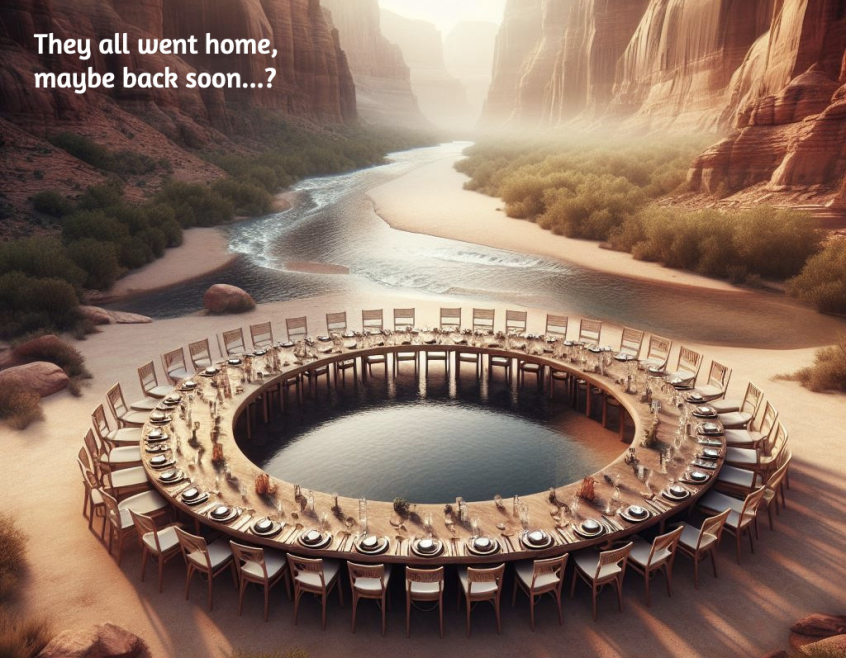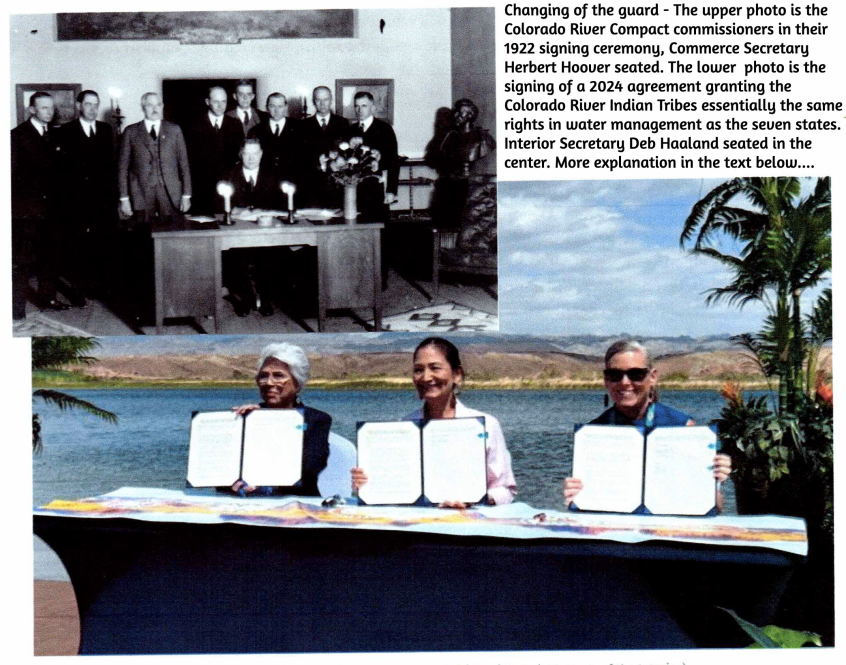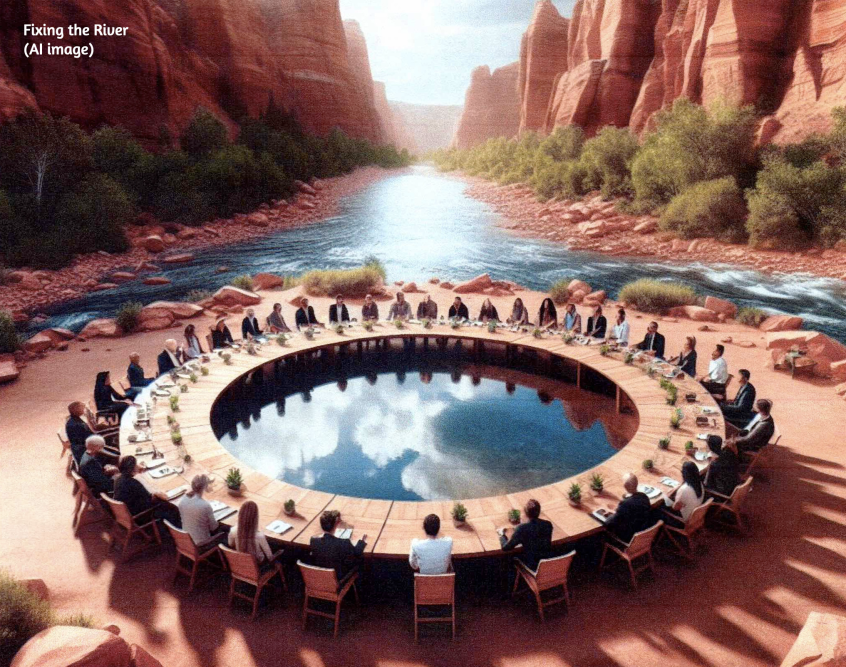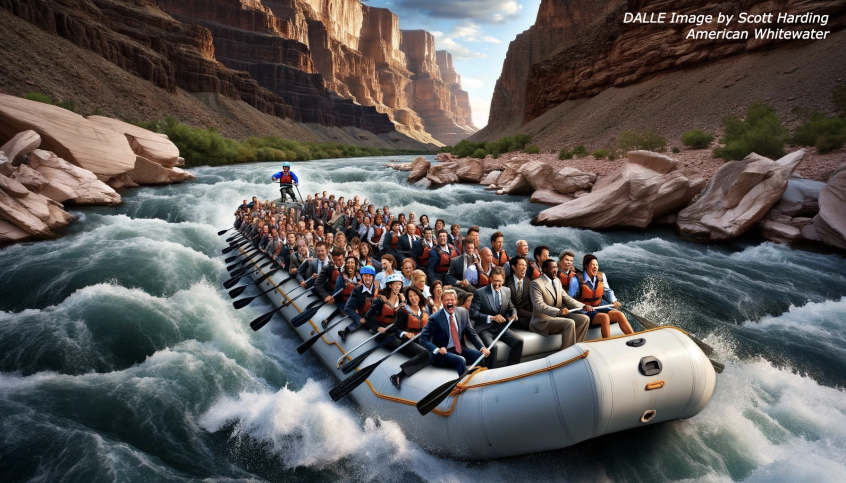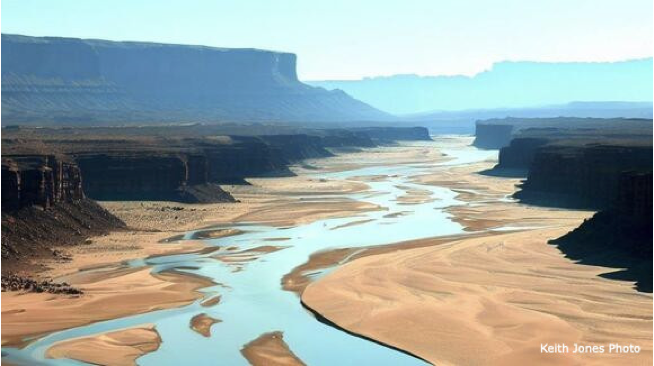Note in passing: this is the 50th post on this ‘weblog’ (a meaningful number to a ten-digit species). I am grateful to those who continue to open and even read these posts. I am obviously writing as much for my own edification and clarification as for yours, in the spirit of British writer E.M. Forster, who said, ‘I don’t know what I think until I see what I write.’ Working it out on paper, as we used to say, except now it is electrons on a screen only a little more organized than a starry night. Most of these posts have been about the Colorado River – a river I can say I ‘love’ in all the complexity that concept of engagement encompasses. I love its natural forms and contours, which leave me thinking that we need a ‘sur-’ category for nature – ‘surnature’ like ‘surreal’ is to ‘real’ – for natural phenomena that seem to be ‘beyond nature,’ at … Read More
Romancing the River: Win-winning the West and our Unimaginable Future
Way too much is happening in the world today, beyond the Colorado River. An Armageddon is shaping up in the mideastern Cradle of Too Many Civilizations that makes Colorado River problems look like sandlot scuffles; we’re in a long slog toward an election in the Untied (sic) States that would not even be close in a rational nation-state but somehow, ominously, is close here; a so-called Cold War is heating up again between competing military-industrial complexes that are again dragging us to the brink of unimaginable disaster. As if the changing climate were not already enough unimaginability. Much about our future is unimaginable today. Those apocalyptic challenges make a focus on my favorite river almost feel like a guilty diversion, but there’s a lot of fundamental roiling and boiling going on along and around the Colorado River too – a lot of it dependent on intelligent adaptation to unimaginables like the supercharged climate. Will the Upper and Lower River Basins … Read More
Romancing the River: Cowboys and Indians
The maze design above is the Great Seal of the Salt River Pima-Maricopa Indian Community, inhabiting a relatively small First People Reservation (53,600 acres) in Arizona at the confluence of the Salt and Gila Rivers. The Gila River system drains most of the state of Arizona – what there is to drain in the subtropical Sonora Desert. The Gila joins the Colorado River at Yuma, near the Mexican border. The reservation was created in 1879 to get the First People out of the way of the Euro-American tsunami coalescing along the Gila as the city of Phoenix – which has since grown to surround the reservation with suburbs. Given the kind of heraldic symbolockry that makes up most Great Seals, signifying power and glory – I think that to put a maze on your Great Seal takes a certain admirable chutzpah, the higher humor of those who laugh with their gods rather than just being laughed at by them. But … Read More
Romancing the River: To Halve and Have Not
In my last post, I reported that the water mavens of both the Upper and Lower Colorado River Basins had each presented the Bureau of Reclamation with plans for managing the river after 2026, when the current, amended ‘Interim Guidelines’ expire. The Interim Guidelines had been implemented in 2007, remember, when it was obvious that the patchwork of existing ‘Law of the River’ (LOTR) guidelines, laws, treaties, compacts and other measures propping up the Colorado River Compact were failing to constructively guide the extensive storage and distribution systems imposed on the river through the turn-of-the-century drought that had begun six years earlier. The Bureau and the seven states have since cobbled together – with help from a big snowpack in the 2023 water year and a rain of cash from the Biden administration’s infrastructure acts – a set of added interim actions to stagger through the remainder of the interim to 2026. The immediate emergency out of the way, the … Read More
Romancing the River: Running the Real River
I really like the AI image above, created by a couple creatives at American Whitewater, Scott Harding and Kestrel Kunz. for a presentation at the Colorado River Water Users Association convention in January. It shows ‘the people who run the river’ running the river. But if you have ever been in that whitewater situation, you know that the river is really in charge; you run the river on the river’s terms. The guy standing up in the back of the boat is in charge of the boat, giving the others in the boat commands like ‘Five forward (strokes of the oars) on the right!’ ‘Two back on the left!’ ‘Everybody three forward!’ – trying to keep the boat on a ‘line’ he or she perceives through the rocks of the rapids. Thinking like the river to run the river. We can draw some obvious analogies to Colorado River management – as Scott and Kestrel do in the picture above of … Read More
Romancing the River: The Appropriation Doctrine – and Its Appropriation
‘The single biggest roadblock to solving the problem of stabilizing the river is the priority system.’ – Tom Buschatzke, Director of Arizona’s Department of Water Resource Last post, I laid out some reasons why the water mavens now engaged in mapping out Colorado River management strategies beyond 2026 – the year ‘interim’ management strategies expire – should consider laying the Colorado River Compact to rest, archiving it along with most of the chain of subsequent compacts, rules and guidelines, legislated acts, minuted treaties and interim patches and props known as the ‘Law of the River,’ and start over with a new compact that actually reflects contemporary river realities. One of those reasons was the fact that the Compact had failed from the start in its primary goal: to provide for an ‘equitable division and apportionment of the use of the waters’ that was not driven by the prior appropriation doctrine, which was leading the seven states into an … Read More
Romancing the River: Prior Appropriation and Present Priorities
‘Fiddling while Rome burns’ – that’s what the Roman emperor Nero is remembered for, practicing on his fiddle while mobs tore up the city. In Ortega’s memorable phrase: responding to the lack of bread by burning down the bakery. But – ‘fiddling while Rome burns’: I often feel like that’s my life these days. We are facing two situations that are called ‘existential’ because they are deeply impacting the way we live – even if we live on as a species. One of the two is immediate, this year, choosing whether we will continue as a more or less free and open democratic society, or will submit ourselves to an authoritarian regime under a malignant narcissist. And the other situation, longer term but more inevitable: whether we will choose to drastically change some foundational cultural systems that are making the planet increasingly uninhabitable for us as a species. This being where we are – what am I doing about it? … Read More
Romancing the River: Thinking Like a River
Greetings in 2024, which promises to be an interesting year, along the Colorado River and beyond it too. May we come out of it affirmed nationally in our commitment to democratic governance, and improved in our execution of it on our river. Back in the earlier part of the last century, the great conservationist and ecologist Aldo Leopold advised us to ‘think like a mountain’ – a large entity occupied by many life forms working together, sometimes cooperatively, sometimes competitively, but keeping the whole system in a living, dynamic balance. Remove any part – the wolves, in his story – and something else would start to go out of balance (the deer) and a kind of disorder would spread through the whole system. When intruding on an ecosystem, he was saying, tread carefully and move incrementally, stop often to observe your unfolding consequences…. Were Leopold here today, as we undertake the sobering Anthropocene task of more effective management strategies for … Read More
Romancing the River: Sun and Water
I was planning for this post to be tip-toeing into a conversation about the prior appropriation doctrine, a conversation which we badly need to have throughout the interior West, but which will likely be vigorously, even violently, opposed by those holding senior water rights in every western watershed. But instead of that – I’ve been captured by the season, the dark season of long nights and short days that has made us – all the way back to our distant ancestors living in stick-and-mud wickiups (maybe especially them) – want to take a break from the daily round, and instead contemplate the larger problem of helping the sun return. So – a short break here, from worrying about the water we don’t have, or about 2026 and a new set of bandaids and splints for dragging into the future the Marley’s Chain that we call the Law of the River. No big bonfire either, or Saturnalia or Christmas or Kwanzaa … Read More
Romancing the River: What Am I Talking About?
Romancing the River – I am aware, as you are probably aware, that when I title these posts ‘Romancing the River,’ I am talking about the life work of the kinds of people who do not usually think of themselves as ‘romantics,’ or of their water-related work as ‘romancing the river.’ Engineers, lawyers, politicians, managers, career bureaucrats, scientists – they all see themselves as rational beings just doing what must be done to rationalize a random force of nature, to put the river to beneficial use feeding, watering, powering and even entertaining us. That’s ‘romancing the river’? It’s almost an insult to call these serious public servants romantics, a term which resonates with most people today as not really very serious, just ‘love stories’ – so unserious it’s hardly worth them answering me when I call them romantics (which they don’t); easier for them to just dismiss me as some kind of nut (which they might). So let me try … Read More
